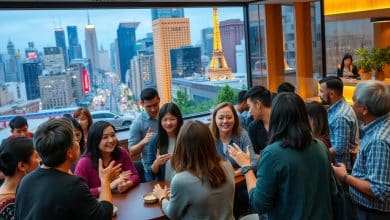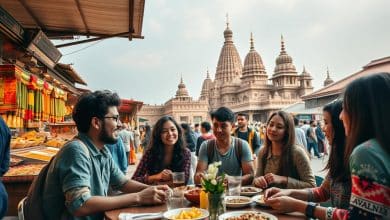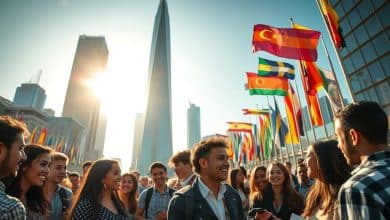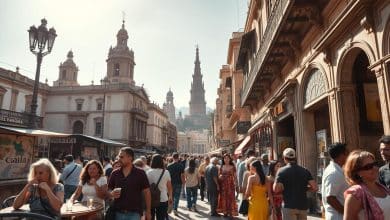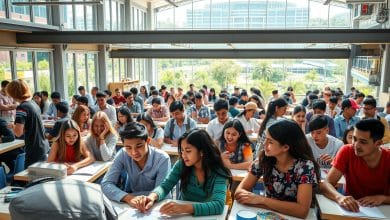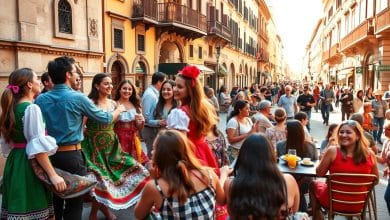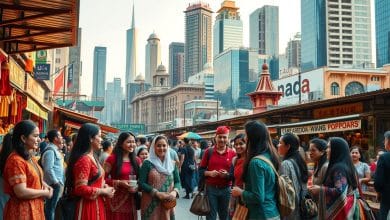Volunteering Opportunities That Combine Travel and Cultural Immersion
More travelers now seek journeys that blend adventure with meaningful impact. Platforms like Workaway host over 50,000 opportunities across 170 countries, creating bridges between curious visitors and communities worldwide. From teaching in rural schools to assisting eco-projects, these initiatives redefine how people engage with the world.
Modern programs prioritize two-way learning, allowing participants to share skills while absorbing local traditions. A farmstay in Italy might involve harvesting olives while mastering regional recipes. Boat maintenance in Southeast Asia could pair with studying coastal ecosystems. These hands-on experiences foster deeper connections than typical tourism.
The landscape spans every interest – animal conservation, tech education, or historic preservation. Participants often discover unexpected passions through these collaborations. Many return home with new perspectives, professional networks, and stories that shape their personal growth.
This approach to travel creates lasting value for both visitors and hosts. It’s not just about seeing landmarks – it’s about contributing to communities while gaining irreplaceable life lessons. The next section reveals how to find programs matching your goals and values.
Introduction to Global Volunteering and Cultural Immersion
Global service programs have redefined what it means to explore the world responsibly. Unlike standard vacations, these initiatives prioritize mutual growth between visitors and locals. Participants share expertise in fields like education or agriculture while absorbing traditions through daily collaboration.
Modern platforms connect skilled individuals with grassroots projects needing support. A tech professional might help digitize records for a coastal town’s fishery. An artist could teach mural painting at a neighborhood center. These partnerships create lasting bonds that benefit both sides.
“Living with a family in Guatemala showed me how shared goals transcend language barriers,” says recent participant Marco Torres.
| Traditional Tourism | Global Service | Impact |
|---|---|---|
| Short-term visits | Extended stays | Deeper relationships |
| Observing culture | Co-creating solutions | Skill transfer |
| Economic spending | Resource sharing | Sustainable development |
Such programs attract those wanting to address real needs while traveling. Over 60% of participants report improved problem-solving skills after working on community-led projects. This hands-on approach turns journeys into catalysts for personal and collective progress.
By focusing on reciprocity, global service fosters understanding across borders. It’s not just about helping – it’s about learning through action and leaving behind tools for continued growth.
Exploring the Concept of Volunteering Cultural Exchange
Structured programs bridge global citizens through shared purpose. These initiatives connect individuals with communities needing support while fostering two-way knowledge transfer. Participants work on local projects like urban gardening or language workshops, gaining firsthand insights into regional customs.
“Teaching English in Morocco taught me more about Berber traditions than any guidebook ever could.”
This mutual learning model helps dismantle assumptions while building practical solutions. Host communities often share ancestral techniques, from sustainable farming to textile artistry.
| Traditional Approach | Mutual Learning Model | Outcome |
|---|---|---|
| One-way assistance | Skill sharing | Preserved traditions |
| Surface-level interaction | Daily collaboration | Trust building |
| Temporary involvement | Ongoing partnerships | Community empowerment |
These experiences reshape how people view their role in global society. Many return home with adapted habits, like eco-friendly practices learned from coastal conservation efforts. Others maintain cross-border friendships that influence career paths.
The most profound shifts occur when participants embrace unfamiliar perspectives. Living with a Thai hill tribe might reveal alternative definitions of success. Assisting at a Chilean community center could redefine one’s approach to problem-solving. These moments create ripple effects that last a lifetime.
Key Benefits of Cultural Exchange Programs
Shared experiences through global programs reshape how individuals engage with the world. Participants gain practical language skills through daily interactions while working on local activities. A marine biologist from Maine might learn traditional fishing methods in Indonesia, discovering ecological wisdom passed through generations.
These collaborations build bridges between people with different life experiences. Working side-by-side on community projects teaches adaptable communication styles. Problem-solving approaches evolve as participants navigate unexpected challenges together.
| Traditional Learning | Mutual Growth Model | Long-Term Value |
|---|---|---|
| Classroom theory | Hands-on practice | Practical skills |
| Individual focus | Team collaboration | Leadership development |
| Fixed schedules | Adaptive workflows | Resilience building |
Many return home with enhanced career prospects. A recent survey shows 78% of employers value international collaboration experience. Networking opportunities often lead to unexpected professional paths.
“Designing rainwater systems in Kenya transformed how I approach engineering challenges,” notes environmental specialist Leah Park.
Personal growth emerges through exposure to alternative perspectives. Participants frequently develop improved emotional intelligence and conflict resolution abilities. These programs prove particularly valuable for those entering global industries or education fields.
Diverse Volunteer Initiatives Around the World
Global service platforms connect skilled individuals with impactful projects in over 170 countries. From urban centers to remote villages, these collaborations address pressing needs while fostering mutual growth. Participants choose roles matching their expertise – whether building schools or protecting endangered ecosystems.
NGO and Grassroots Partnerships
Local organizations tackle issues like healthcare access and social justice through hands-on projects. A legal advisor might help draft policies for fair housing in South Africa. Community kitchens in Brazil often need nutritionists to optimize meal programs. These partnerships create tangible improvements while teaching participants about systemic challenges.
Learning Through Environmental Action
Eco-focused programs combine education with practical conservation work. Teams in Costa Rica monitor sea turtle populations while teaching tourists about marine protection. Gardening initiatives in India demonstrate water-efficient farming techniques to combat drought. One agricultural student noted, “Designing compost systems in Nepal changed how I view waste management globally.”
| Project Type | Skills Utilized | Community Impact |
|---|---|---|
| Renewable Energy | Engineering | Reduced energy costs |
| Literacy Programs | Teaching | Improved employment rates |
| Reforestation | Botany | Biodiversity protection |
These initiatives prove that meaningful contributions come in countless forms. Whether restoring historic sites or developing youth coding workshops, every project strengthens both participants and host communities.
Integrating Travel and Community Development
When journeys align with local priorities, they become engines for progress. Forward-thinking initiatives now connect travelers with projects needing diverse skills – from urban planning to renewable energy solutions. This synergy transforms sightseeing into collaborative problem-solving.
Local initiatives gain fresh insights through this approach. Architects might redesign public spaces in Colombian towns. Tech specialists could create digital literacy programs in rural India. These partnerships address specific needs while respecting regional traditions.
Key benefits of this model include:
- Sustainable skill transfers that outlast a visitor’s stay
- Economic growth through improved infrastructure
- Preservation of heritage alongside modern innovations
“Co-designing a water filtration system in Ghana taught me more about effective engineering than any textbook,” shares project lead Amina Diallo.
| Traditional Travel | Integrated Model | Outcome |
|---|---|---|
| Passive observation | Active participation | Practical solutions |
| Short-term spending | Long-term investment | Local capacity building |
| Generic experiences | Customized projects | Relevant impact |
Host regions often see improved access to global networks. A coastal town in Mexico recently expanded its eco-tourism offerings after collaborating with marine biologists. These relationships frequently evolve into ongoing mentorships and resource sharing.
By grounding travel in local realities, participants gain deeper understanding. They return home not just with photos, but with proven strategies for creating change.
Experiential Learning Through Cultural Immersion
True understanding emerges when theory meets practice in real-world settings. Immersive programs place individuals in environments where knowledge grows through daily interactions. Participants learn ancestral farming techniques while discussing crop cycles with Peruvian villagers. They master negotiation skills by navigating bustling Indonesian markets. These living classrooms transform abstract concepts into tangible abilities.
Language skills flourish through necessity rather than textbooks. A traveler helping rebuild trails in Iceland might grasp conversational phrases faster through teamwork than formal study. Daily tasks like shopping at Moroccan souks teach colloquial expressions and nonverbal cues. This organic approach builds fluency rooted in real-life contexts.
“Bartering for supplies in Vietnam’s Mekong Delta taught me more about communication than any language app,” recalls program alum Jessica Nguyen.
| Traditional Education | Experiential Model | Outcome |
|---|---|---|
| Memorization | Application | Practical mastery |
| Controlled scenarios | Unscripted challenges | Adaptive thinking |
| Individual achievement | Collaborative success | Teamwork skills |
Navigating unfamiliar social dynamics strengthens problem-solving instincts. Participants discover innovative approaches to shared goals, like coordinating harvest festivals with Thai rice farmers. These interactions reshape worldviews and spark creative solutions to personal or professional hurdles.
Many uncover unexpected passions through hands-on exposure. A graphic designer might develop urban gardening skills while revitalizing Nairobi community spaces. Such discoveries often influence career paths or hobbies long after the journey ends.
Navigating the Volunteer Service Directory Landscape
Finding meaningful projects worldwide has become streamlined with advanced directory features. Platforms like Workaway combine human expertise with technology, manually reviewing each host profile to ensure quality while offering tailored matching advice. With 50,000+ options, these systems help users pinpoint opportunities that align with their skills and aspirations.
User-Friendly Search and Filters
Modern directories let users refine searches by region, timeline, and required abilities. Detailed profile pages showcase project specifics – from farmstay tasks in Portugal to coding workshops in Kenya. Filters highlight essential details like accommodation types or language preferences, reducing overwhelm.
| Traditional Search | Smart Filters | Benefit |
|---|---|---|
| Keyword-only | Multi-criteria sorting | Precision matches |
| Static listings | Real-time updates | Current opportunities |
| Limited details | 360° project views | Informed decisions |
Personalized Recommendations
Algorithms analyze user interests and past engagements to suggest hidden gems. One participant noted, “The platform recommended a marine conservation role I’d never have found alone.” Interactive video previews let users visualize environments before applying, building confidence in their choices.
Safety features like verified reviews and response rate indicators add layers of trust. These tools empower users to create journeys that benefit both hosts and themselves, turning complex searches into purposeful connections.
Top Destinations for Cultural Exchange Volunteer Opportunities
Exploring new regions while contributing to local initiatives creates transformative journeys. From coastal conservation to urban renewal, diverse locations offer partnerships that blend skill-sharing with immersive learning. Popular platforms connect participants with over 170 nations, each presenting distinct ways to engage.
Discover U.S. and North American Projects
Northern regions provide unexpected chances for cross-border learning. Canadian Arctic programs focus on indigenous-led climate research, where participants document traditional ecological knowledge. Urban initiatives in New Orleans combine music heritage preservation with youth mentorship programs.
| Region | Focus Area | Skill Development |
|---|---|---|
| Pacific Northwest | Forest restoration | Ecosystem management |
| Southwest USA | Water conservation | Engineering innovation |
| Quebec | Language preservation | Bilingual education |
Global Volunteer Destinations
Costa Rica’s cloud forest initiatives teach permaculture techniques while protecting biodiversity. In Vietnam, participants restore ancient architecture in Hoi An’s Old Town alongside master craftspeople. Greek island programs merge olive harvest traditions with digital tourism strategies.
South Africa’s youth empowerment projects near Cape Town demonstrate grassroots change. One coordinator notes, “Collaborating on coding workshops here reshaped how I approach tech education.” Brazilian favela art collectives offer insights into community-led urban renewal.
These global connections prove that impactful partnerships thrive in every corner of the planet. Whether learning sustainable fishing in Thailand or assisting eco-lodges in Colombia, each experience builds bridges between passionate individuals.
How to Find the Perfect Host or Project
Successful partnerships begin by aligning personal strengths with host needs. Start by listing skills you can reliably offer – whether teaching digital literacy or constructing eco-homes. Be honest about physical limits and adaptability to rural or urban environments.
Research potential hosts like you’d vet a new colleague. Read 10+ reviews to spot patterns in feedback. Look for detailed project descriptions that specify daily tasks and living arrangements. One participant shared, “A host’s transparency about cold showers prepared me better than any packing list.”
| Search Step | Key Actions | Outcome |
|---|---|---|
| Self-Assessment | Identify transferable skills | Targeted applications |
| Host Research | Analyze reviews & photos | Realistic expectations |
| Direct Communication | Clarify work hours & meals | Clear agreements |
Time management proves crucial. A two-week stint might focus on quick wins like painting community centers. Longer stays allow mentoring relationships to develop. Always budget extra days for orientation and unexpected delays.
Flexibility transforms good matches into great ones. A host needing last-minute help with harvest festivals might offer unique insights into regional traditions. Embrace projects that challenge initial assumptions – these often yield the richest growth.
Authentic Cultural Exchange Experiences Through the Workaway Model
Building meaningful connections while exploring new places forms the core of modern travel experiences. The Workaway platform structures interactions where shared living and collaboration become gateways to understanding different ways of life. Participants join hosts in daily activities ranging from organic farming to digital projects, creating natural environments for mutual learning.
This approach transforms temporary stays into relationship-building opportunities. By working toward common goals, individuals from varied backgrounds discover shared values and interests that transcend geographical boundaries.
Connecting with Hosts and Travel Buddies
Workaway’s system helps users find companions who align with their travel objectives. Members often team up through profile features showing compatible schedules and skills. One participant noted, “I partnered with two programmers from Texas to help a Moroccan school develop its website – we still collaborate remotely.”
| Traditional Travel | Workaway Approach | Result |
|---|---|---|
| Solo itineraries | Group collaborations | Stronger networks |
| Surface-level interactions | Shared responsibilities | Deeper bonds |
| Fixed schedules | Adaptive plans | Unexpected opportunities |
These partnerships often evolve into lasting friendships. Many users return annually to help hosts with seasonal projects, creating ongoing cycles of knowledge sharing. The platform’s review system helps identify hosts committed to reciprocal relationships where everyone grows.
Through this model, travelers gain more than memories – they build global communities. Shared meals become storytelling sessions, work hours turn into skill-sharing workshops, and temporary rooms transform into spaces for lifelong connections.
Incorporating Off-Grid and Sustainable Volunteer Projects
Innovative initiatives demonstrate how practical skills meet environmental stewardship. The Portugal FabLab project blends digital fabrication with organic farming, creating spaces where makers collaborate on solutions for rural challenges. Participants learn to construct energy-efficient houses using clay and recycled materials while developing food forests.
- Natural building techniques for durable homes
- Rainwater harvesting systems that combat drought
- Permaculture designs transforming barren land
| Traditional Housing | Sustainable Approach | Impact |
|---|---|---|
| Concrete materials | Local earth & timber | Lower carbon footprint |
| Grid dependency | Solar/wind systems | Energy independence |
| Waste production | Circular resource use | Zero-waste communities |
One participant shared:
“Building a cob house in Portugal taught me how architecture can harmonize with ecosystems.”
Gardening initiatives focus on soil regeneration through companion planting. Teams in Barão de São João intercrop nitrogen-fixing plants with fruit trees, creating self-sustaining food sources. These methods reduce irrigation needs while boosting biodiversity.
Such projects leave lasting impressions. Many alumni implement compost systems or greywater recycling at home, proving that hands-on learning sparks lifelong sustainable habits.
Engaging Diplomatic and Volunteer Roles in Cultural Exchange
Structured collaborations between civilians and diplomatic personnel reveal new pathways for global understanding. The Cultural Exchange for Diplomats (CED) initiative connects U.S.-based individuals with embassy staff in Washington, DC, fostering connections that transcend official protocols. Participants gain rare access to international perspectives while supporting diplomats adapting to American life.
Membership Requirements and Participation Guidelines
CED maintains clear criteria to ensure productive partnerships. Applicants must either hold U.S. citizenship or demonstrate three years of authorized residency. A $140 annual fee and monthly five-hour commitment create accountability for sustained engagement.
| Traditional Programs | Diplomatic Model | Key Difference |
|---|---|---|
| Open enrollment | Visa-specific focus | Targeted impact |
| General skills | Protocol training | Specialized knowledge |
| Flexible schedules | Fixed monthly hours | Structured collaboration |
This model prioritizes long-term relationship building. Volunteers assist families holding A, G, or NATO visas, addressing practical needs like school enrollment or healthcare navigation. One participant noted:
“Helping a diplomat’s children adjust to DC schools taught me more about educational systems than any seminar.”
These interactions strengthen community ties while offering insider views of international affairs. Through shared experiences, both sides develop nuanced perspectives on global citizenship.
Real Stories and Testimonials from Global Volunteers
Personal journeys come alive through the voices of those who’ve lived them. Workaway’s video galleries reveal raw moments – a chef laughing while learning Senegalese recipes, engineers celebrating a finished solar panel installation. These clips showcase bonds formed through shared activities, from building schools to cooking family meals.
Platform features like Workaway TV let viewers explore stories through first-hand perspectives. One video follows a teacher’s month mentoring students in Guatemala, capturing both challenges and breakthroughs. Another documents urban gardeners transforming vacant lots into community hubs across Detroit.
Beyond professional skills, these accounts highlight human connections. Many participants return home with lifelong friends from unexpected places. A retired nurse’s testimonial describes weekly calls with her host family in Portugal: “We swap recipes and life updates – distance can’t break what we built.”
Such narratives prove that meaningful travel leaves imprints on all involved. Whether through 30-second reels or detailed blogs, these stories inspire others to create their own chapters in global collaboration.
FAQ
How do programs blend travel with community engagement?
What types of projects are available globally?
Are there age restrictions for joining initiatives?
Can short-term commitments make an impact?
How do hosts and travelers communicate effectively?
What safety measures exist for participants?
Do these experiences help career development?
How sustainable are off-grid projects?
Published on: 21 de August de 2025

